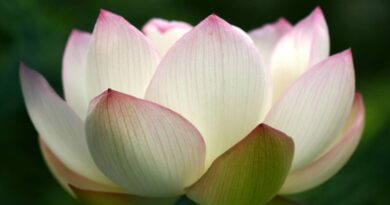SECLUSION
Seclusion
§ 6.1 I have heard that on one occasion the Blessed One was staying near Sāvatthī in Jeta’s Grove, Anāthapiṇḍika’s monastery. Now at that time a certain lay follower from Icchānaṅgalaka had arrived in Sāvatthī on some business affairs. Having settled his affairs in Sāvatthī, he went to the Blessed One and, on arrival, having bowed down to him, sat to one side. As he was sitting there, the Blessed One said to him, “At long last you have managed to come here.”
“For a long time I have wanted to come see the Blessed One, lord, but being involved in one business affair after another, I have not been able to do so.”
Then, on realizing the significance of that, the Blessed One on that occasion exclaimed:
How blissful it is, for one who has nothing
who has mastered the Dhamma,
is learned.
See him suffer, one who has something,
a person bound in body
with people. — Ud 2:5
§ 6.2 “‘This Dhamma is for one who is reclusive, not for one who is entangled.’ Thus was it said. With reference to what was it said? There is the case where a monk, when living in seclusion, is visited by monks, nuns, lay men, lay women, kings, royal ministers, sectarians & their disciples. With his mind bent on seclusion, tending toward seclusion, inclined toward seclusion, aiming at seclusion, relishing renunciation, he converses with them only as much is necessary for them to take their leave. ‘This Dhamma is for one who is reclusive, not for one in entanglement.’ Thus was it said. And with reference to this was it said.” — AN 8:30
§ 6.3 Now at that time a large number of monks, after the meal, on returning from their alms round, had gathered at the meeting hall and were engaged in many kinds of bestial topics of conversation: conversation about kings, robbers, & ministers of state; armies, alarms, & battles; food & drink; clothing, furniture, garlands, & scents; relatives; vehicles; villages, town, cities, the countryside; women & heroes; the gossip of the street & the well; talks of the dead; tales of diversity, the creation of the world & of the sea; talk of whether things exist or not.
Then the Blessed One, emerging from his seclusion in the late afternoon, went to the meeting hall and, on arrival, sat down on a seat made ready. As he sat down there, he addressed the monks: “For what topic of conversation are you gathered together here? In the midst of what topic of conversation have you been interrupted?”
“Just now, lord, after the meal, on returning from our alms round, we gathered at the meeting hall and got engaged in many kinds of bestial topics of conversation: conversation about kings, robbers, & ministers of state… tales of diversity, the creation of the world & of the sea; talk of whether things exist or not.”
“It isn’t right, monks, that sons of good families, on having gone forth out of faith from home to the homeless life, should get engaged in such topics of conversation, i.e., conversation about kings, robbers, & ministers of state… talk of whether things exist or not.
“There are these ten topics of (proper) conversation. Which ten? Talk on having few wants, on contentment, on seclusion, on non-entanglement, on arousing persistence, on virtue, on concentration, on discernment, on release, and on the knowledge & vision of release. These are the ten topics of conversation. If you were to engage repeatedly in these ten topics of conversation, you would outshine even the sun & moon, so mighty, so powerful—to say nothing of the wanderers of other sects.” — AN 10:69
§ 6.4 MahāKassapa:
One shouldn’t go about
surrounded, revered
by a company:
one gets distracted;
concentration
is hard to gain.
Fellowship with many people
is painful.
Seeing this,
one shouldn’t approve
of a company.
A sage shouldn’t visit families:
one gets distracted;
concentration
is hard to gain.
He’s eager & greedy for flavors,
whoever misses the goal
that brings bliss.
They know it’s a bog—
the reverence & veneration
of families—
a subtle arrow, hard to extract.
Offerings are hard for a worthless man
to let go. — Thag 18
§ 6.5
If, in your course, you don’t meet
your equal, your better,
then continue your course,
firmly,
alone.
There’s no fellowship with fools. — Dhp 61
§ 6.6
Renouncing violence
for all living beings,
harming not even a one,
you would not wish for offspring,
so how a companion?
Wander alone, like a rhinoceros.
For a sociable person
there are allurements;
on the heels of allurement, this pain.
Seeing allurement’s drawback,
wander alone, like a rhinoceros.
One whose mind
is enmeshed in sympathy
for friends & companions,
neglects the true goal.
Seeing this danger in intimacy,
wander alone, like a rhinoceros….
If you gain a mature companion,
a fellow traveler, right-living & wise,
overcoming all dangers
go with him, gratified,
mindful.
If you don’t gain a mature companion,
a fellow traveler, right-living & wise,
go alone
like a king renouncing his kingdom,
like the elephant in the Mātaṅga wilds,
his herd.
We praise companionship
—yes!
Those on a par, or better,
should be chosen as friends.
If they’re not to be found,
living faultlessly,
wander alone, like a rhinoceros.
Seeing radiant bracelets of gold,
well-made by a smith,
clinking, clashing,
two on an arm,
wander alone, like a rhinoceros,
[Thinking:]
“In the same way,
if I were to live with another,
there would be careless talk or abusive.”
Seeing this future danger,
wander alone, like a rhinoceros.
Because sensual pleasures,
elegant, honeyed, & charming,
bewitch the mind with their manifold forms—
seeing this drawback in sensual strands—
wander alone, like a rhinoceros.
“Calamity, tumor, misfortune,
disease, an arrow, a danger for me.”
Seeing this danger in sensual strings,
wander alone, like a rhinoceros….
Avoid the evil companion
disregarding the goal,
intent on the out-of-tune way.
Don’t take as a friend
someone heedless & hankering.
Wander alone, like a rhinoceros.
Consort with one who is learned,
who maintains the Dhamma,
a great & quick-witted friend.
Knowing the meanings,
subdue your perplexity,
(then) wander alone, like a rhinoceros….
Unstartled, like a lion at sounds.
Unsnared, like the wind in a net.
Unsmeared, like a lotus in water:
wander alone, like a rhinoceros….
At the right time consorting
with the release through
goodwill,
compassion,
empathetic joy,
equanimity,
unobstructed by all the world,
any world,
wander alone, like a rhinoceros.
Having let go of
passion,
aversion,
delusion;
having shattered
the fetters;
undisturbed at the ending of life,
wander alone, like a rhinoceros.
People follow & associate
for a motive.
Friends without a motive these days
are rare.
They’re shrewd for their own ends, & impure.
Wander alone, like a rhinoceros. — Sn 1:3
§ 6.7 Then a large number of monks went to the Blessed One and, on arrival, having bowed down to him, sat to one side. As they were sitting there, they informed him: “Lord, there is a certain monk by the name of Elder who lives alone and extols the virtues of living alone.”
Then the Blessed One told a certain monk, “Come, monk. In my name, call the monk named Elder, saying, ‘The Teacher calls you, my friend.’”
“As you say, lord,” the monk answered and, having gone to Ven. Elder, on arrival he said, “The Teacher calls you, my friend.”
“As you say, my friend,” Ven. Elder replied. Then he went to the Blessed One and, on arrival, having bowed down to him, sat to one side. As he was sitting there, the Blessed One said to him, “Is it true, Elder, that you live alone and extol the virtues of living alone?”
“Yes, lord.”
“But how do you live alone and extol the virtues of living alone?”
“Lord, alone I enter the village for alms, alone I return, alone I sit withdrawn [in meditation], alone I do walking meditation. That is how I live alone and extol the virtues of living alone.”
“There is that way of living alone, Elder. I don’t say that there isn’t. Still, listen well to you how your living alone is perfected in its details, and pay close attention. I will speak.”
“As you say, lord,” Ven. Elder responded.
The Blessed One said: “And how is living alone perfected in its details? There is the case where whatever is past is abandoned, whatever is future is relinquished, and any passion & desire with regard to states of being attained in the present is well subdued. That is how living alone is perfected in its details.”
That is what the Blessed One said. Having said it, the One Well-gone further said this:
“All-conquering,
all-knowing, intelligent;
with regard to all things,
unadhering;
all-abandoning,
released in the ending of craving:
him I call
a man who lives
alone.” — SN 21:10
§ 6.8
With craving his companion, a man
wanders on a long, long time.
Neither in this state here
nor anywhere else
does he go beyond
the wandering-on.
Knowing this drawback—
that craving brings stress into play—
free from craving,
devoid of clinging,
mindful, the monk
lives the wandering life.” — Sn 3:12



